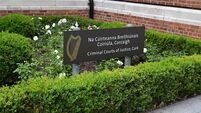GAA code of conduct formalises power to expel members
The Association’s Central Council heard presentations from its Code of Conduct workgroup last weekend and will consider that workgroup’s report at its next meeting on February 27.
The workgroup describes the code as “a basic set of principles that establishes acceptable standards of behaviour for members, officers, players, parents/guardians, mentors, supporters, match officials, units and teams in addition to the requirements of rules applying to members.”














